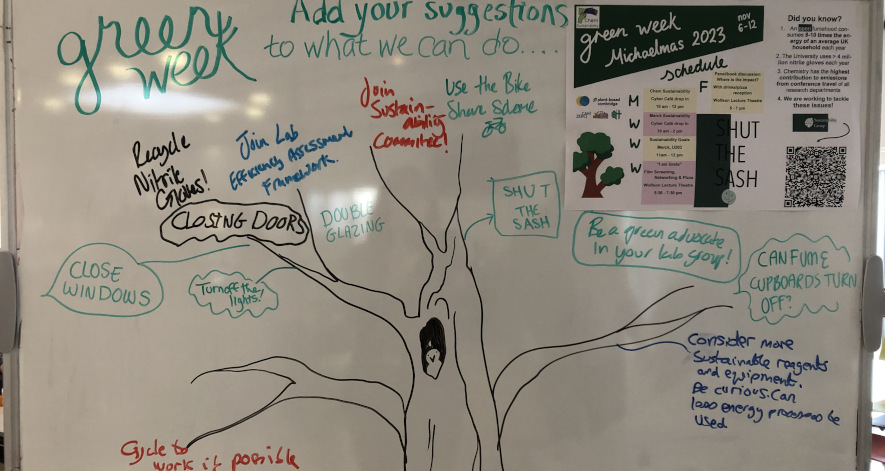
First Green Week
The Sustainability committee ran its first Green Week at the beginning of November, in which they encouraged staff members to reduce energy use in department and asked for suggestions on how to do this. One relatively easy way to reduce energy use is to "Shut the Sash" on energy-intensive fume hoods when they're not in use. To help students and researchers remember to do this, the committee created popular 'happy face' labels which form a smile when a fume hood is closed.
Other activities
Other activities during Green Week included a drop-in session to hear from Merck on their sustainability goals, a screening of the film I am Greta about Greta Thunberg (followed by plant-based pizza), and a panel event which included speakers Dr Chris Macdonald, author of Operation sustainable human, and Dr Sara Lightowlers, a campaigner for the Mothers’ Climate Action Network and Cambridgeshire Parents for Sustainable Travel and Plant-based Councils.
Great strides
Support Services Manager Marita Walsh says: "By its very nature a chemistry department has very large energy needs, from the use of fume hoods and strict ventilation rules to keep researchers safe, to the need to keep cell samples at constant temperatures."
She adds: "Over the past decade we have made great strides in improving efficiency, such as the introduction of the Wind responsive system in 2017 and the LED light replaces currently taking place, and we will continue to strive to reduce electricity consumption where the opportunity presents itself.
Reducing plug load
“There are many steps individuals can take to reduce plug load, which is one of the main energy uses that we can control in the department. This includes sharing electrical equipment where possible to maximise its capacity, and turning it off when it isn’t needed.”
Working towards our goals
The committee is working towards continuing to improve the Nitrile glove recycling scheme, encouraging group members to shut the sashes on fume hoods, and asking research groups to adopt the LEAF scheme (Laboratory Efficiency Assessment Framework), which helps labs take steps to be more sustainable and efficient.
Chloe Balhatchet, a second-year PhD student in the Forse group, has been the driving force behind setting up the committee and enlisting departmental support.
Chloe says: “48 people are now members of the Chemistry Sustainability Teams channel, and we hope to see this community continuing to grow.”
Below: The suggestions received from staff members about how to save energy in the department.

